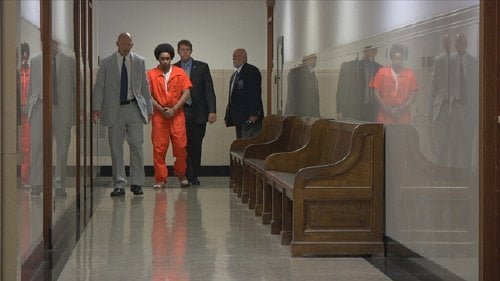The House I Live In

Since Richard Nixon declared the War on Drugs in 1971 over $1 trillion have been spent and over 45 million arrests were made in the losing battle to stop drugs in America. Filmmaker Eugene Jarecki explores the history of this war, the longest in US history, and how it is destroying the lives of those arrested for their non-violent crimes and their families, too, in “The House I Live In.”
Laura's Review: A
writer/director Eugene Jarecki ("Why We Fight") is the son of parents who fled Nazi Germany and his family believes the U.S. should be a safe haven for all. But Eugene has a second family, that of his family's black housekeeper, whose children and grandchildren played with the Jarecki boys. After having lost touch with many of them, he was surprised to learn how many have struggled as adults. When he asked Nannie what happened she had a one word answer - drugs. Jarecki began to look further into the issue and discovered the issue was far more complex than most knew in "The House I Live In." Eugene Jarecki exposes the 'War on Drugs' as a systematic failure in the same intelligent, compelling way he took on the military industrial complex in "Why We Fight," but his latest film is both more personal and more devastating. This is a documentary one hopes is shown in the White House, the Senate and Congress. In fact, every thinking American should take the time to watch this documentary. Like "Why We Fight," much of the information Jarecki includes may be known to many, but he has such a steady, even-handed build in making his argument you will be horrified all over again. It's not just the statistics, and here are many and they are shocking, but the underlying historical and social implications that are effectively disturbing. You will hear a Lincoln historian, Richard Lawrence Miller, compare the War on Drugs to the Holocaust and be convinced. Then Jarecki finds a Lexington, Oklahoma corrections officer who finds his way to many of this man's same conclusions. The numbers are impressive. Since 1971, when Richard Nixon first made drugs a priority, this country has spent $1 trillion and arrested 45 million. But drug use is just as prevalent. Nixon himself knew that the money spent on rehabilitation was far more effective than that spent on law enforcement, but the opposite proved true with the political soundbite and drug laws grew increasingly more prohibitive. Jarecki lays out how we have systematically used drug laws to keep minority immigrants down, beginning with opium and Chinese railroad workers. He also uses his vast array of experts to show how not only are our prison systems disproportionately full of black men, but how we now jail more people for nonviolent crimes. The fallout is incredible. Black families suffer, these men and their kids finding no way out, the very definition of a vicious cycle. Law enforcers are frustrated, but picking up pot smokers in poor neighborhoods garners more arrests than a murder investigation. Corrections facilities have seen how educational programs offer the incarcerated a new lease on life, giving them the ability to reenter society as plumbers and electricians, yet these are the first type of programs to be cut. Implicit, but not stated - that instead of having these men become tax payers, we bear the cost of cycling them back into the prison systems, a far greater economic impact than any cost cutting measures. Jarecki goes for the big picture and paints it very clearly, but he also continues to return to the personal. Individual stories, like the plight of the very charismatic Anthony Johnson, are sad and frustrating. And there's Nennie herself, telling Eugene that although she tried to do everything right for her family - moving north, following the Jareckis to New York for a doubled salary - that ultimately it proved their downfall. "The House I Live In" is a powerful demand for political reform.

